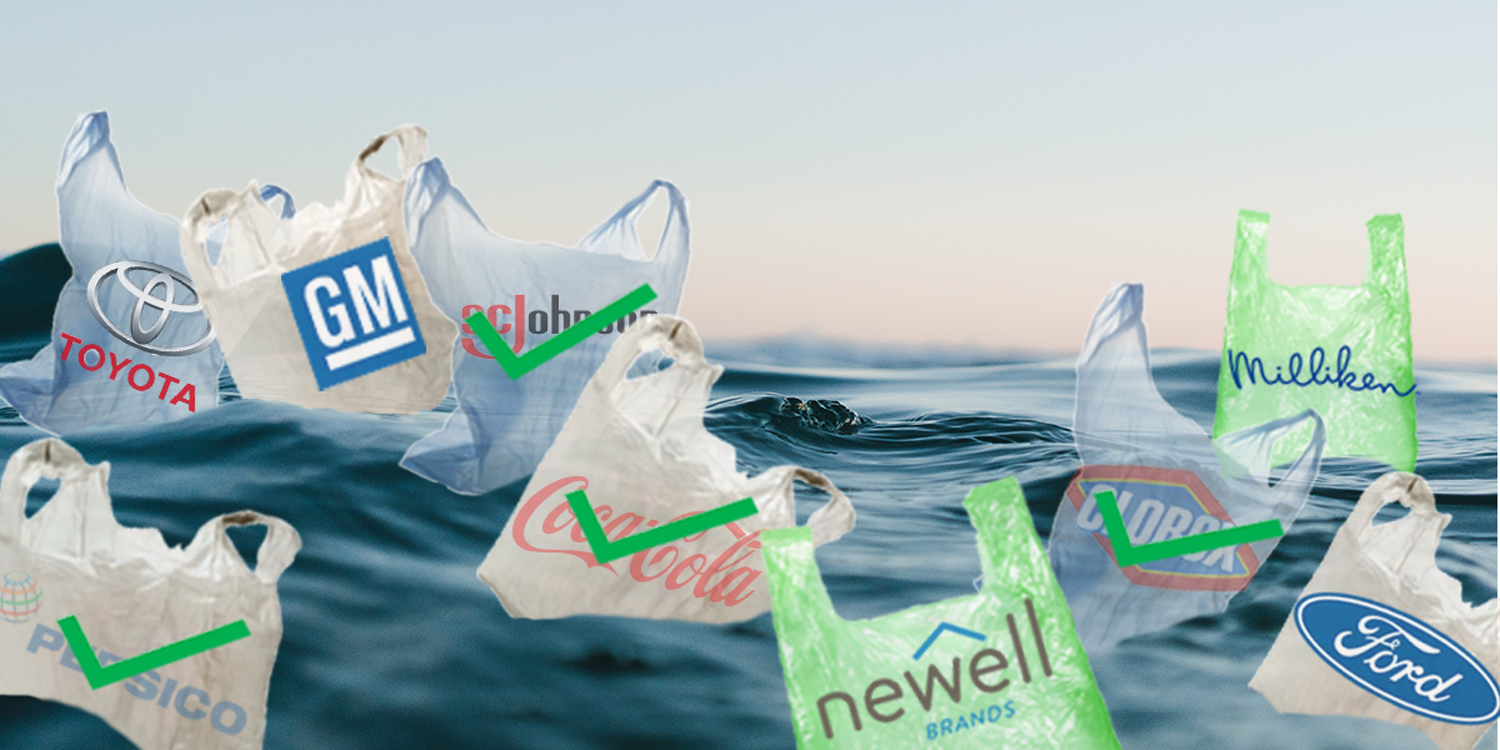UPDATE #3: Another company takes action. On September 24, 2019, SC Johnson is also ending its membership with the Plastic Industry Association—it's the largest consumer product maker to do so yet! Demand the rest do the same!
UPDATE #2: We're equally as excited to announce that on July 23, 2019, Coca-Cola and PepsiCo both announced they would also be ending their membership with the Plastic Industry Association! Keep pressuring the rest!
UPDATE #1: We're excited to announce we've heard from Benno Dorer, the chairman and CEO of Clorox, that they will NOT be renewing their memberships in the Plastic Industry Association in 2019! Read more here.
Every minute the equivalent of an entire garbage-truck–size load of plastic gets dumped into our oceans. In the United States, stores distribute 100 billion single-use plastic bags per year, many of which end up in our waterways.
And it's not slowing down.
Array
The Plastic Industry Association (PLASTICS) and its lobbying arm, the American Progressive Bag Alliance (APBA), are working diligently to keep us reliant on disposable plastic products, known as single-use plastics. These products include things many of us use every day, from plastic shopping bags to straws to styrofoam containers.
Fortunately for our planet, local communities across the nation are working to move us away from our "one and done" habits. Nearly 350 cities and towns have enacted local ordinances on plastics, such as plastic bag fees or single-use bag bans. These community-driven actions have been shown to keep plastic out of our oceans and litter off of our streets.
Unfortunately, PLASTICS is scheming to stop local grassroots solutions to our pollution problem, and its supported by companies such as Coca-Cola and Clorox.
With the help of draft legislation from the American Legislative Exchange Council (ALEC), the industry association has successfully blocked 70 million Americans in 10 states from enacting bag ordinances to reduce litter and environmental pollution. The industry association lobbyists are also working to pass new preemptive laws in other states, including Ohio and South Carolina.
While the Plastic Industry Association does not release its full member list, a review of the committees posted on its website shows that many companies that are publicly committed to corporate social responsibility and environmental performance goals are members of PLASTICS. By funding the industry association, these companies are actively supporting PLASTICS's lobbying efforts.
We're starting with nine consumer-product companies that have all made pledges toward environmental action:
-
Ascena Retail Group, apparel retailer (owner of Ann Taylor, LOFT, Justice)
-
Clorox, consumer products (owner of Burt’s Bees and Britta)
-
Coca-Cola, food and beverage products
-
PepsiCo, food and beverage products
-
General Motors, automotive products
-
Ford Motor Company, automotive products
-
Milliken, textile products
-
Newell Rubbermaid, consumer products
-
SC Johnson, consumer products
The current use of plastic in our world has dire consequences. Humanity’s short industrialized period -- we've only been using disposable plastics in this way since the 1950s -- has already led some scientists to dub this period the "plastic age." Our environment is drowning in our plastic excess. Many of us can easily conjure vivid images of plastic pollution in our world:
Massive floating islands of plastic trash.
The stomach of an albatross filled with nothing but plastic debris.
A sea turtle choking on a filmy bag.
And it's not just wildlife at risk. Tiny plastic particles, known as microplastics, are also showing up in what we eat and drink, from seafood to salt to beer. We need to do more research on potential impacts on human health, but the fact is that we're consuming a lot of plastic, made from materials known to be toxic.
The production of plastics is troubling as well. Most plastics are made from fossil fuels and the oil and gas industry wants to make sure we stay reliant on these single-use products. Cheap fracked gas in the United States has been a windfall for the plastics industry, and experts say that expanding plastic production could be the leading cause of greenhouse gas emission growth in the coming years.
Individuals and organizations are working to create a more sustainable future and clean landscapes and beaches for our families to enjoy, but the plastic industry and their affiliates are spending big to thwart local democratic efforts.
If companies stop supporting PLASTICS as member businesses, the industry association will feel the heat. We must make sure PLASTICS knows that the American people are paying attention to their deceptive, undemocratic tactics.
Some companies have shown leadership and their actions are true to their corporate values: Becton Dickinson, a medical technology firm, recently left PLASTICS after learning of the industry association’s lobbying efforts on local plastic ordinances.
This shows that pressure on companies can work because the companies spend billions of dollars on advertising and promoting their brand value. The companies on our list all have mission statements that claim support for a more sustainable future, including:
-
"We are committed to taking care of our environment and reducing our footprint. We give back to the communities where we work and want to make life better for families today and for the next generation. We do all this because it’s the right thing to do.” -- SC Johnson.
-
"Our brands reflect our passion for playing an active role in making the world a better place… supporting the environment are key ways in which we fulfill our promise." -- Ascena Retail Group
-
“We are uniquely positioned to help create a more sustainable world. Our emphasis on responsible environmental stewardship enables our consumers to fulfill their aspirations to live, work and play more sustainably." -- Newell Rubbermaid
It's time for these companies to defend our right to take local grassroots actions that will protect and preserve our environment.
